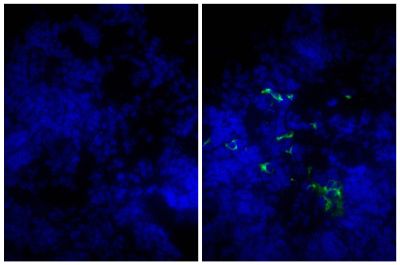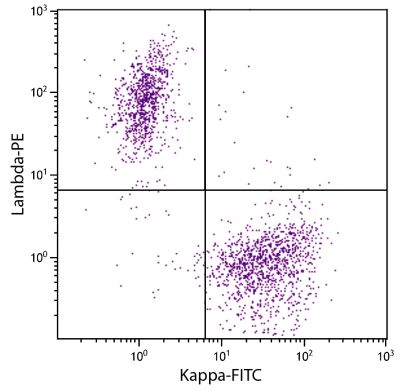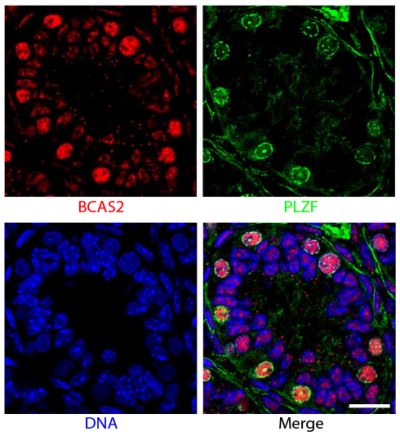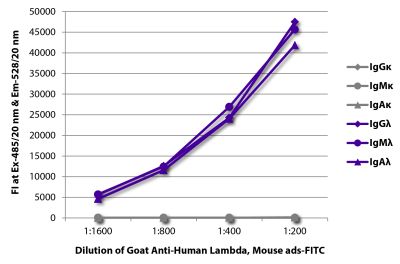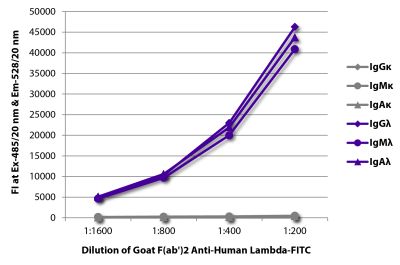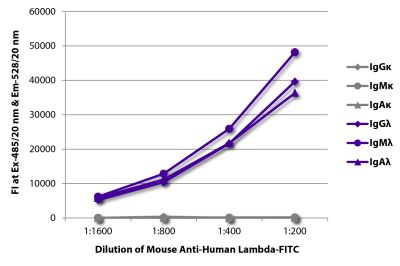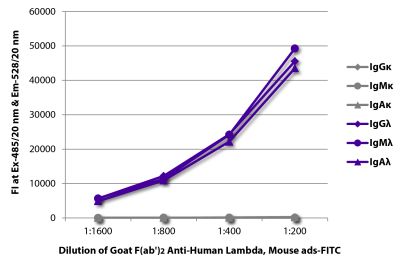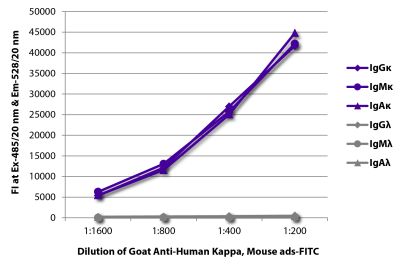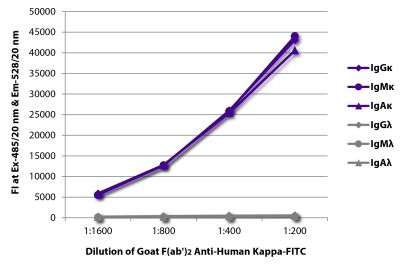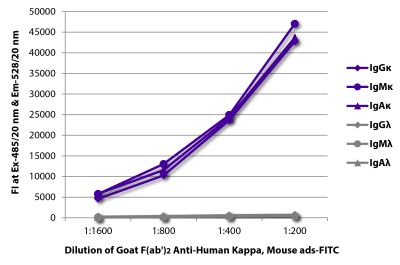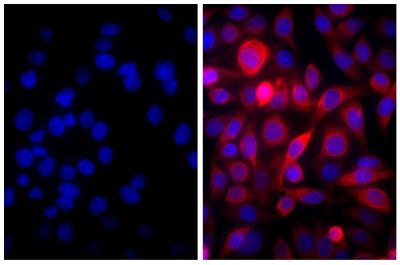Goat Anti-Human Lambda-FITC
Cat. No.:
2070-02
Goat Anti-Human Lambda-FITC antibody for use in flow cytometry, immunohistochemistry / immunocytochemistry, and western blot assays.
$157.00
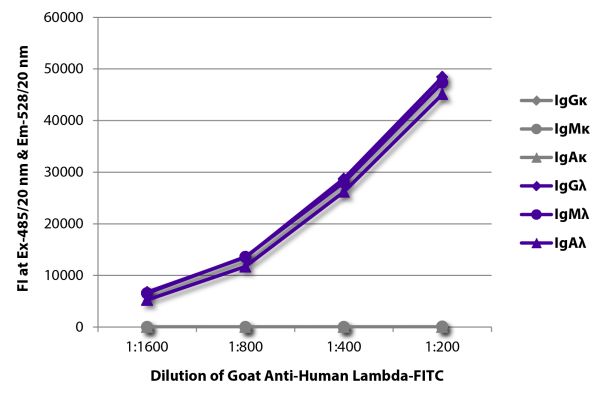


| Isotype | Goat IgG |
|---|---|
| Isotype Control | Goat IgG-FITC |
| Specificity | Reacts with human λ light chains |
| Source | Pooled antisera from goats hyperimmunized with human λ light chains |
| Cross Adsorption | Human κ light chains; may react with λ light chains from other species |
| Purification Method | Affinity chromatography on human λ light chains covalently linked to agarose |
| Conjugate | FITC (Fluorescein) |
| Buffer Formulation | Phosphate buffered saline containing < 0.1% sodium azide |
| Clonality | Polyclonal |
| Concentration | 1.0 mg/mL |
| Volume | 1.0 mL |
| Recommended Storage | 2-8°C; Avoid exposure to light |
| Applications |
Quality tested applications for relevant formats include - ELISA 1-11 FLISA Flow Cytometry 18-20 Other referenced applications for relevant formats include - ELISpot 12 Immunohistochemistry-Paraffin Sections 13 Immunocytochemistry 14-16 Western Blot 16 Immunoprecipitation 17 Surface Plasmon Resonance 21 Stimulation 22 |
| RRID Number | AB_2795750 |
| Gene ID |
3535 (Human) |
| Gene ID Symbol |
IGL (Human) |
| Gene ID Aliases | IGL@; IGLC6 |
Documentation
Certificate of Analysis Lookup
Enter the Catalog Number and Lot Number for the Certificate of Analysis you wish to view
- 1. Sy MS, Guo Y, Stamenkovic I. Distinct effects of two CD44 isoforms on tumor growth in vivo. J Exp Med. 1991;174:859-66. (ELISA)
- 2. Houpt DC, Pfrommer GS, Young BJ, Larson TA, Kozel TR. Occurrences, immunoglobulin classes, and biological activities of antibodies in normal human serum that are reactive with Cryptococcus neoformans glucuronoxylomannan. Infect Immun. 1994;62:2857-64. (ELISA)
- 3. Deng Y, Notkins AL. Molecular determinants of polyreactive antibody binding: HCDR3 and cyclic peptides. Clin Exp Immunol. 2000;119:69-76. (ELISA)
- 4. Pancook JD, Beuerlein G, Pecht G, Tang Y, Nie Y, Wu H, et al. In vitro affinity maturation of human IgM antibodies reactive with tumor-associated antigens. Hybrid Hybridomics. 2001;20:383-96. (ELISA)
- 5. Hinton PR, Johlfs MG, Xiong JM, Hanestad K, Ong KC, Bullock C, et al. Engineered human IgG antibodies with longer serum half-lives in primates. J Biol Chem. 2004;279:6213-6. (ELISA)
- 6. Tsurushita N, Park M, Pakabunto K, Ong K, Avdalovic A, Fu H, et al. Humanization of a chicken anti-IL-12 monoclonal antibody. J Immunol Methods. 2004;295:9-19. (ELISA)
- 7. Hinton PR, Xiong JM, Johlfs MG, Tang MT, Keller S, Tsurushita N. An engineered human IgG1 antibody with longer serum half-life. J Immunol. 2006;176:346-56. (ELISA)
- 8. Sydor JR, Normant E, Pien CS, Porter JR, Ge J, Grenier L, et al. Development of 17-allylamino-17-demethoxygeldanamycin hydroquinone hydrochloride (IPI-504), an anti-cancer agent directed against Hsp90. Proc Natl Acad Sci USA. 2006;103:17408-13. (ELISA)
- 9. Akamatsu Y, Pakabunto K, Xu Z, Zhang Y, Tsurushita N. Whole IgG surface display on mammalian cells: Application to isolation of neutralizing chicken monoclonal anti-IL-12 antibodies. J Immunol Methods. 2007;327:40-52. (ELISA)
- 10. Guan Y, Sajadi MM, Kamin-Lewis R, Fouts TR, Dimitrov A, Zhang Z, et al. Discordant memory B cell and circulating anti-Env antibody responses in HIV-1 infection. Proc Natl Acad Sci USA. 2009;106:3952-7. (ELISA)
- 11. Xu Z, Juan V, Ivanov A, Ma Z, Polakoff D, Powers DB, et al. Affinity and cross-reactivity engineering of CTLA4-Ig to modulate T cell costimulation. J Immunol. 2012;189:4470-7. (ELISA)
- 12. Saletti G, Çuburu N, Yang JS, Dey A, Czerkinsky C. Enzyme-linked immunospot assays for direct ex vivo measurement of vaccine-induced human humoral immune responses in blood. Nat Protoc. 2013;8:1073-87. (ELISPOT)
- 13. Bonda DJ, Webber KM, Siedlak SL, Perry G, Friedland RP, Smith MA. The pathology of Alzheimer disease elicits an in vivo immunological response. Am J Immunol. 2007;3:10-14. (IHC-PS)
- 14. Campana D, Coustan-Smith E, Janossy G. The immunologic detection of minimal residual disease in acute leukemia. Blood. 1990;76:163-71. (ICC)
- 15. Campana D, Farrant J, Inamdar N, Webster AD, Janossy G. Phenotypic features and proliferative activity of B cell progenitors in X-linked agammaglobulinemia. J Immunol. 1990;145:1675-80. (ICC)
- 16. Hasegawa H, Forte C, Barber I, Turnbaugh S, Stoops J, Shen M, et al. Modulation of in vivo IgG crystallization in the secretory pathway by heavy chain isotype class switching and N-linked glycosylation. Biochim Biophys Acta. 2014;1843:1325-38. (ICC, WB)
- 17. Santiago T, Kulemzin SV, Reshetnikova ES, Chikaev NA, Volkova OY, Mechetina LV, et al. FCRLA is a resident endoplasmic reticulum protein that associates with intracellular Igs, IgM, IgG and IgA. Int Immunol. 2011;23:43-53. (IP)
- 18. Kumagai M, Coustan-Smith E, Murray DJ, Silvennoinen O, Murti KG, Evans WE, et al. Ligation of CD38 suppresses human B lymphopoiesis. J Exp Med. 1995;181:1101-10. (FC)
- 19. Minegishi Y, Conley ME. Negative selection at the pre-BCR checkpoint elicited by human μ heavy chains with unusual CDR3 regions. Immunity. 2001;14:631-41. (FC)
- 20. Dühren-von Minden M, Übelhart R, Schneider D, Wossning T, Bach MP, Buchner M, et al. Chronic lymphocytic leukaemia is driven by antigen-independent cell-autonomous signalling. Nature. 2012;489:309-12. (FC)
- 21. Wagner K, Kwakkenbos MJ, Claassen YB, Maijoor K, Böhne M, van der Sluijs KF, et al. Bispecific antibody generated with sortase and click chemistry has broad antiinfluenza virus activity. Proc Natl Acad Sci USA. 2014;111:16820-5. (Surface Plasmon Resonance)
- 22. Nechansky A, Robertson MW, Albrecht BA, Apgar JR, Kricek F. Inhibition of antigen-induced mediator release from IgE-sensitized cells by a monoclonal anti-FcεRI α-chain receptor antibody: implications for the involvement of the membrane-proximal α-chain region in FcεRI-mediated cell activation. J Immunol. 2001;166:5979-90. (Stim)
See All References


